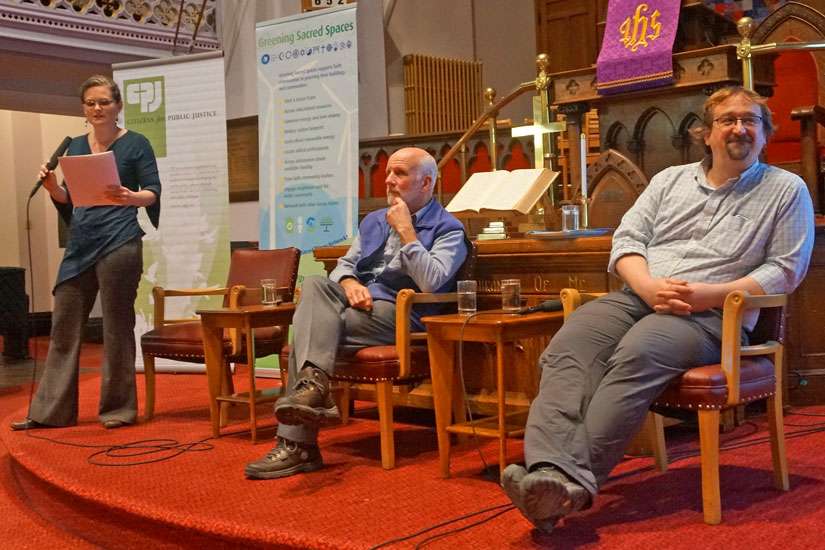Mardi Tindal, the former moderator of the United Church of Canada, was among speakers at a panel discussion March 9 on the theme “What’s next for faith communities” following the COP21 international climate change talks in Paris last December and the recent First Ministers’ meeting on Canada’s commitments in Paris.
The event, co-sponsored by the Archdiocese of Ottawa, United Church Conference of Ottawa-Montreal, Citizens for Public Justice (CPJ), Faith and the Common Good, the Canadian Foodgrains Bank, the Polaris Institute and Ecology Ottawa, featured an interview of Tindal by Pulpit and Politics author Dennis Gruending and a panel of representatives from some of the sponsoring groups.
Appearing via Skype to reduce her carbon footprint, Tindal said she is still “bumping into a lot of denial about climate change” and even some “personal resentment” against herself “for saying this is something people needed to be concerned about.”
Tindal said faith communities must “accept responsibility to contribute to a climate of hope,” noting she encounters many who say, “It’s too little too late,” and who fall into a “climate of despair.” One must resist the temptation to fall into pessimism on one hand and “ungrounded idealism on the other,” she said. The safest and best place to be is to be open to each other, and to help each other “find our way to hope.”
While scientists might be able to warn of the impacts of climate change, faith communities can provide the moral dimension and spiritual nurture and prayer on combating climate change. Tindal said “it meant a great deal to see the non-stop prayer cycle” initiated by CPJ so that every hour of the COP21 talks was covered by prayer.
Faith communities also must “take seriously the need to live with integrity.” That means reducing our own carbon emissions on our own properties as much as we expect the government to do.
It also means committing to help people in the global south who suffer disproportionately from climate change impacts caused by the north. “The south does not have the resources there to adapt to decarbonization.”
They also must work with and encourage those working in various levels of government and in other civil society groups to have an “ethical conversation,” Tindal said. Working together will help us all figure out the next steps. Faith groups must also continue their advocacy, she said.
During the panel discussion, Polaris institute director Tony Clarke said taking on the environment means also taking on the economy. The system is broken, he said, noting high unemployment and poverty in the midst of affluence. He urged joining in the One Million Climate Jobs campaign to create employment in a green economy; public investment in renewable energy; a renewable buildings campaign to make them energy efficient; and a commitment to public transit, inside cities and between them.
CPJ’s senior policy analyst Karri Munn-Venn spoke of how the federal government is not going to be able to live up to its commitments without the provinces. “They need to be emboldened by our action,” she said.
Munn-Venn said they will be looking to the upcoming federal budget to see what commitments there are to the environment and whether subsidies to oil and gas will remain. In the meantime, faith communities can commit to learning about the subject, sharing what they learn, study the issue and pray, she said.


